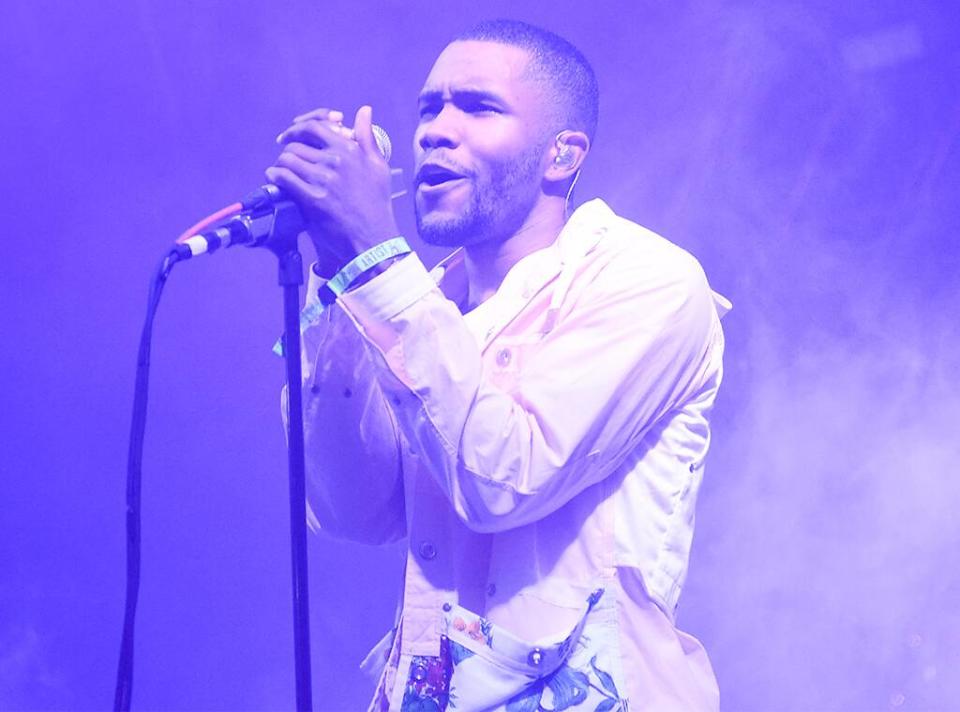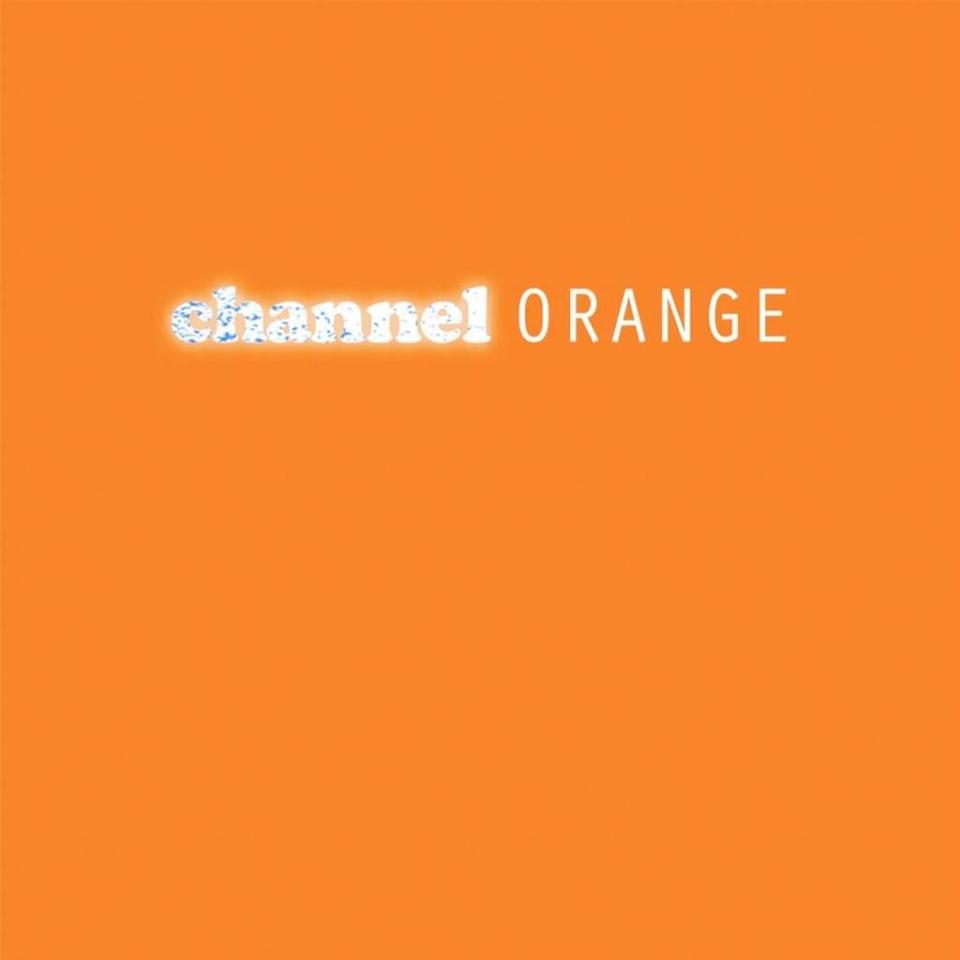How Frank Ocean Built a Career on His Own Elusive Terms

For Frank Ocean, remaining a mystery seems almost the point.
It's been eight years since the R&B artist dropped his debut album, channel ORANGE, on July 10, 2012, pushing the genre into experimental new territory with its expert use of ambient sounds, avant-garde influences and free-form flows. The near-universal acclaim the LP received—including nods for Album of the Year, Record of the Year (for lead single "Thinkin Bout You") and Best New Artist at the 2013 Grammys—was the sort that any burgeoning artist dreams of. An invitation to play the game with an industry whose doors are notoriously hard to open.
But it quickly became abundantly clear that Ocean—born Christopher Cooksey—wasn't your average artist and had no interest in taking the traditional path laid before him.
Instead, as fans know all too well, he leaned into the elusive, crafting a career built on his terms—regardless of who it might frustrate in the process.
The Most Memorable Music Moments Since 1990
Suddenly the sweetheart of the music industry—thanks to both the way his sound reinvigorated the genre and the ground he broke living openly as a bisexual man—there was probably nothing Ocean couldn't have done in the wake of channel ORANGE's game-changing release.
Instead, for a time, he disappeared.
Signed to Def Jam all the way back in 2009, Ocean was increasingly dissatisfied with the label's perceived lack of urgency towards his career prior to his debut release—a release he all but forced into existence thanks to the breakthrough, independently-released mixtape Nostalgia, Ultra in 2011—and their reaping of the majority of the rewards his art had generated.

"It started to weigh on me that I was responsible for the moves that had made me successful, but I wasn't reaping the lion's share of the profits, and that was problematic for me," the notoriously press-averse Ocean told The New York Times in a rare 2016 interview. So he left L.A. for London with little more than a duffel bag of clothes and a backpack containing the hard drives he keeps all his music, backups included, on. ("I'd rather the plane goes down in flames and the drives go down with me than somebody put out a weird posthumous release," he said of that unorthodox approach.)
He would work sporadically on what would come to be known as his twin 2016 releases, Endless and Blonde, suffering a year-long bout of writer's block at one point, while also replacing his entire team and winding down what he's referred to as a "seven-year chess game" with Def Jam that ultimately saw him buying himself out of his contract and purchasing back all of his own master recordings with his own money.
The Waiting Game: Artists With Albums Nowhere in Sight
As part of the deal, Def Jam would distribute Endless, which was made available—exclusively, at first—as a streaming video album on Apple Music following a two-day livestream that showed Ocean sporadically woodworking. Two days later, he independently released Blonde. Wholly his own, the album could be viewed as a bit of a middle-finger to his old label, overshadowing his last release with them while landing at No. 1 with the third-biggest debut of the year behind only Beyoncé and Drake.
Wanting both albums to be more personal than channel ORANGE—which Ocean said was written in two weeks, an end product that "wasn't always that gritty, real-life depiction of the real struggle that happened"—he took his time. "I know that once it's out, it's out forever, so I'm not really tripping on how long it's taking," he told the newspaper in 2016.

And once they were released, he let them live on their own and speak for themselves. Rather than the usual promo tour, he opted to explore the world for a month. "China, Japan, Oceania, France, just around," he said. "Casual."
In their wake, his indifference towards the industry machine calcified further. Whereas with channel ORANGE, he played the game and submitted for Grammy nods—though he only agreed to perform at the 2013 ceremony if he could play the song of his choosing, deep cut "Forrest Gump"—this time around, he didn't bother.
"Like performing at the V.M.A.s, being tapped to perform at the Grammys — me saying yes to those things had a lot to do with how those things made me feel before I was actually in the business. And just wanting to be rubbing shoulders with those people and being seen at those places. I still was reluctant and sort of skeptical of those things because I questioned whether or not I was prepared," he told the NYT, adding of the Grammys, in particular, "That institution certainly has nostalgic importance. It just doesn't seem to be representing very well for people who come from where I come from, and hold down what I hold down."
Coachella Headliners Over the Years
"I think the infrastructure of the awarding system and the nomination system and screening system is dated," Ocean continued. "I'd rather this be my Colin Kaepernick moment for the Grammys than sit there in the audience."
In the four years since his last full-length release, he's released tracks here and there, and further teased his fans about plans that, as of yet, have failed to materialize. "If you liked two thousand and seventeen then you'll love two thousand and eighteen," he wrote in a photo essay for British magazine i-D in fall 2017. And yet, in the whole of 2018, he only released one song of his own—a cover of "Moon River" from Breakfast at Tiffany's.
Perhaps all the disparate releases were building up to something big this year. After all, he was due to headline Coachella. But now that coronavirus has sidelined the music festival entirely, when Ocean will return with his fifth full-length project is anyone's guess.
And now that he's not beholden to the demands of any contracts, it's clear that's exactly how he wants it. "Because I'm not in a record deal, I don't have to operate in an album format. I can operate in half-a-song format. I believe that I'm one of the best in the world at what I do, and that's all I've ever wanted to be," Ocean told the New York Times in 2016, hinting that music might not be endgame for him. "It's more interesting for me to figure out how to be superior in areas where I'm naïve, where I'm a novice."
"This has always been my life and no one else's," he reminded, "and that's how it's always been since the day I came in it."
